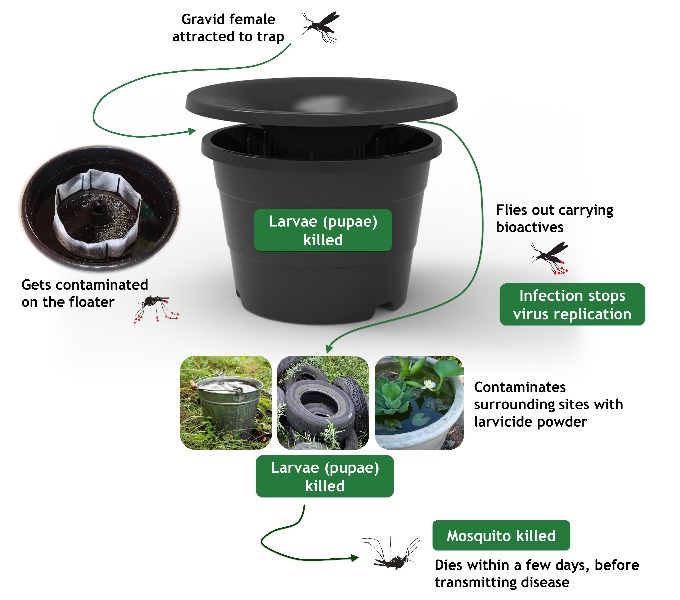Apart from not wanting the annoyance and discomfort of mosquito bites, with dengue fever in Singapore, it’s even more important to prevent mosquitoes from breeding in your home or garden. The team at Rentokil shares some key ways to do this, including a unique mosquito trap that takes care of it 24/7.
Mosquitoes in Singapore
They are a recurring issue here, and with this all-year-round summer you want to be able to enjoy it to the max – and be outside (or in) without getting heaps of mosquito bites! So what can we do?
#1 Stay aware
First of all, keep up to date with the dengue clusters reported in Singapore. If you happen to be living in one of the clusters, take extra care to avoid getting bitten and do what you can to prevent mosquitoes from breeding in your homes.
If you notice bites, check if they’re from mosquitoes (they are usually round and elevated with a dot in the middle) and observe if you feel any symptoms of dengue fever. Telltale signs include high fever, rash, nausea and severe joint and muscle pain.
#2 Make personal preventive choices
Mosquitoes are particularly active in the mornings and nights, so consider wearing long-sleeved clothing and long bottoms during those times of the day for extra protection. The insects are also said to be attracted to dark colours, so avoid wearing those if you can.
Plus, mosquitoes can detect human heat and sweat. This means that after a workout or perspiring a lot, it’s a good idea to take a shower to prevent potential bites.

#3 Use mosquito repellents
Besides patches and sprays, you can also opt for natural repellents such as lemongrass, which contains citronella oil. You’ll need to reapply them throughout the day. Some products require more frequent reapplication than others so be sure to read the instructions.
#4 Regularly inspect your home
Ensure that your home, garden and patio are free from potential breeding grounds. This is a good habit whether or not you’re staying in a dengue cluster. Clear gutters, empty buckets and vases, and take note of any other places (such as bathrooms and kitchens) where stagnant water can collect. Also, quickly wipe up water spills as mosquitoes have the ability to breed in even the smallest of puddles.
#5 Arrange for fogging
NEA has emphasised that fogging is only necessary when there are adult mosquitoes present or when there is a dengue outbreak.
If you’re living in a condo or an HDB, the condo management and town council will arrange fogging on your behalf. But if you’re staying in a landed house, you’ll need to call up a pest control service to arrange this. They’ll be able to advise if there is a need to fog, plus how often you need to do it.
#6 Set up mosquito traps or nets
Get mosquito nets to cover your windows to prevent mosquitoes from entering your home. For extra protection, you could even install one above your bed to keep you covered at night. Check the nets regularly to ensure that they don’t have holes or gaps due to wear and tear.
You can easily buy mosquito traps everywhere, from supermarkets and hardware stores in your neighbourhood to online stores such as Lazada and Amazon. The traps on the market can be used indoors or outdoors, and they variously use smells, lights, colours and temperature to attract mosquitoes, with the aim of trapping the insects before they bite and lay eggs. To ensure that they do their job, you’ll need to keep them maintained and place them strategically where mosquitoes tend to congregate.
How about this mosquito trap?
Rentokil is offering an outdoor mosquito trap that works quite differently from regular ones. Here, the mosquitoes do the work for you!
The Rentokil In2Care Outdoor Mosquito Trap first attracts female mosquitoes to lay eggs within the trap. When the mosquito enters, it gets contaminated by larvicide. This larvicide kills any eggs the mosquito lays, and the powder also attaches itself to the mosquito. Then, when the mosquito flies away to other breeding sites, the larvicide is taken along for the ride. The result? Eggs at the new breeding spots are killed before they have a chance to develop into adults. The larvicide also affects the infected mosquito’s ability to bite, and slowly kills it within seven to 14 days.

What’s great about this method of mosquito control is that it doesn’t just prevent the growth of mosquitoes. It also gets rid of the adults. Unlike fogging or mosquito nets, the benefits go beyond a single location and there is all-day control.
You’ll also be glad to know that the ingredients used in the trap are environmentally-friendly and safe to use, with low toxicity. They’re effective for mosquitoes that are insecticide-resistant, too.
Written in collaboration with:
Rentokil
6347 8138 | rentokil.com.sg

Read more about living in Singapore.
How to prevent and deal with mould in your home
The expat’s guide to where to live in Singapore



